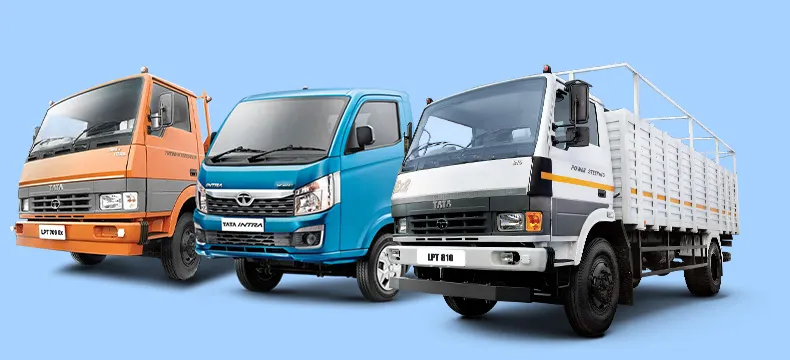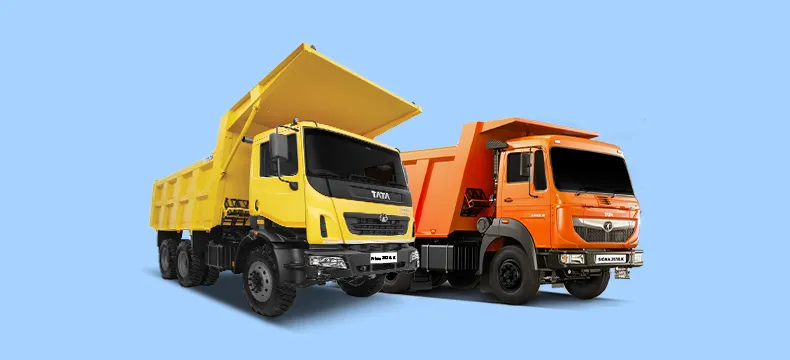29 Dec 2025

What Does LCV Commercial Vehicle Mean?
- Tata Motors
- 14 Nov 2024
- COMMERCIAL VEHICLE
In Tanzania, where transportation is key to driving economic activity, commercial vehicles play a crucial role in ensuring that goods and services reach their destination on time. Among the wide variety of commercial vehicles available, light commercial vehicles (LCVs) have become increasingly popular due to their versatility and efficiency. Whether you’re a business owner or part of the logistics industry, understanding what LCV means in commercial vehicles is essential for making informed choices.
This blog will break down LCV Commercial Vehicle definitions, explore their various types, and highlight their benefits for businesses in Tanzania.
Defining LCV: What Does LCV Mean in Commercial Vehicles?
LCV stands for light commercial vehicle, which refers to vehicles designed to transport goods but with a lower payload capacity compared to heavier trucks. Typically, LCV commercial vehicles have a gross vehicle weight (GVW) of up to 8 tonnes. In Tanzania, LCVs are commonly used for tasks like city deliveries, rural transportation of small loads, and various other business applications that require efficiency and flexibility.
The key advantage of light commercial vehicles lies in their ability to navigate both congested urban areas and rural roads while carrying substantial loads. LCVs are particularly useful for businesses that don’t need the immense load capacity of larger trucks but still require reliable transportation solutions for goods and services.
Types of LCV Commercial Vehicles
LCVs come in various forms, each tailored to suit specific business needs. Here are some of the most common types of light commercial vehicles used across Tanzania’s industries:
1. Pick-up Trucks
One of the most popular types of LCV commercial vehicles, pick-up trucks are widely used in Tanzania for transporting goods across short distances. Their compact size makes them ideal for navigating tight city streets, while their durability allows them to handle rural roads as well. Tata Motors’ range of pick-up trucks, such as the Tata Intra V20, is well-suited for transporting agricultural produce, construction materials, or general goods.
2. Delivery Vans
Delivery vans are another common form of light commercial vehicle used for last-mile deliveries in urban areas. Their enclosed structure provides better protection for goods, making them ideal for transporting fragile items or perishable goods that require careful handling. Delivery vans are often used by courier companies and retailers to ensure timely deliveries in bustling urban centres.
3. Mini-Trucks
Mini trucks are smaller than traditional trucks but are designed to carry heavier loads than pick-up trucks. These vehicles strike a balance between load capacity and maneuverability, making them perfect for businesses that operate in both rural and urban settings. Tata Motors’ LPT 709 and LPT 810 are excellent examples of mini-trucks that can handle a variety of transportation needs while offering fuel efficiency and cost-effectiveness.
4. Chassis Cabs
Chassis cabs are another versatile type of LCV commercial vehicle, as they allow businesses to customise the vehicle to meet their specific requirements. Whether you need a refrigerated unit for transporting food or a flatbed for construction materials, a chassis cab offers flexibility and adaptability.
Each of these LCV commercial vehicles provides unique advantages, allowing businesses in Tanzania to choose the right vehicle based on their needs, terrain, and cargo type.
LCVs: Benefits for Tanzanian Businesses
There are several reasons why light commercial vehicles are a preferred choice for many businesses in Tanzania:
1. Fuel Efficiency
One of the primary benefits of LCV commercial vehicles is their fuel efficiency. Designed to carry lighter loads, LCVs typically consume less fuel than heavier trucks, making them an economical choice for businesses that operate over long distances. This not only helps reduce operating costs but also contributes to a more environmentally friendly transport solution.
2. Lower Maintenance Costs
Due to their smaller size and lighter load capacity, light commercial vehicles often require less maintenance compared to their heavier counterparts. This is a significant advantage for businesses in Tanzania, where the cost of vehicle repairs and downtime can have a big impact on profitability.
3. Versatility
LCVs are highly adaptable and can be used across various industries. From agriculture and retail to logistics and construction, LCV commercial vehicles provide the flexibility to transport a range of goods. Their ability to navigate both urban and rural roads makes them an invaluable asset for businesses operating across different terrains.
4. Easier Navigation in Urban Areas
Tanzania’s urban areas, particularly cities like Dar es Salaam, can be congested. Light commercial vehicles are more agile and can navigate through traffic more easily than larger trucks. This makes them ideal for last-mile deliveries and urban distribution, where timely delivery is critical.
Conclusion
In Tanzania’s dynamic business landscape, choosing the right vehicle can have a lasting impact on your operations. LCV commercial vehicles offer a balance of fuel efficiency, versatility, and ease of use, making them an excellent choice for businesses across various industries. Whether you’re running a small enterprise or managing a large-scale operation, investing in the right light commercial vehicle can boost your efficiency and lower your costs.
As Tanzania continues to develop, the demand for flexible and efficient transportation solutions will only grow. Light commercial vehicles are set to play a pivotal role in meeting the needs of the country's diverse industries, offering businesses the reliability and efficiency they need to thrive.
FAQs
What are the advantages of using LCVs over heavier commercial vehicles for urban deliveries?
LCVs are more agile and can navigate through congested urban streets more easily than heavier trucks. They are also more fuel-efficient and generally have lower maintenance costs, making them ideal for city deliveries.
How do fuel efficiency and maintenance costs compare between LCVs and heavier trucks?
Light commercial vehicles typically consume less fuel and require less maintenance compared to heavier trucks. This makes them a cost-effective solution for businesses that do not need to transport very large loads.
What types of payload capacities are typically associated with light commercial vehicles?
The payload capacity of LCVs generally ranges from 3.5 tonnes to 8 tonnes, depending on the vehicle type. This makes them suitable for a wide range of applications, from small deliveries to more substantial loads.
- Tags
Latest Blogs



















